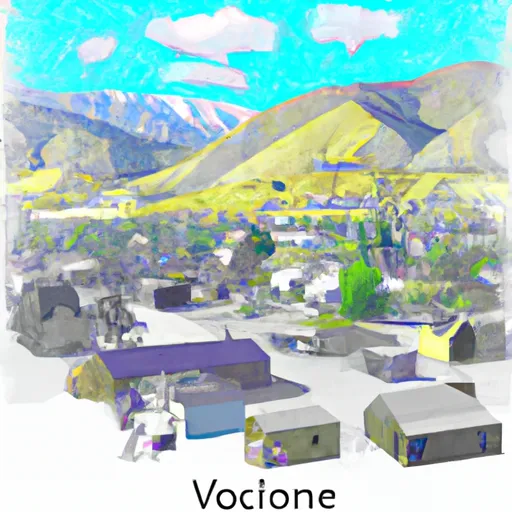-
 Snoflo Premium
Snoflo Premium
Get unlimited access to all our content
With no Ad interruptions! - Start Your Free Trial Login with existing account
Genoa
Eden Index
Climate
8.5
•
Recreation
4.8
•
Community
•
Safeguard
5.1/10

Genoa is a small town located in Douglas County, Nevada. The climate in Genoa is characterized by hot summers and cold winters. The average temperature in July is around 86°F, while the average temperature in January is around 31°F. The town is located near the Carson River, which is an important source of hydrology constituents. Outdoor recreation opportunities in Genoa include hiking, fishing, and mountain biking. The town is surrounded by scenic landscapes and offers easy access to the nearby Sierra Nevada Mountains. Additionally, there are several parks and nature reserves in the area, including the Genoa Canyon Trailhead and the Spooner Lake State Park.
What is the Eden Index?
The Snoflo Eden Index serves as a comprehensive rating system for regions, evaluating their desirability through a holistic assessment of climate health, outdoor recreation opportunities, and natural disaster risk, acknowledging the profound impact of these factors on livability and well-being.
Climate Health Indicator (CHI): 8.5
Genoa receives approximately
243mm of rain per year,
with humidity levels near 60%
and air temperatures averaging around
10°C.
Genoa has a plant hardyness factor of
6, meaning
plants and agriculture in this region thrive during a short period during spring and early summer. Most
plants will die off during the colder winter months.
By considering the ideal temperature range, reliable water supplies, clean air, and stable seasonal rain or snowpacks, the Climate Health Indicator (CHI) underscores the significance of a healthy climate as the foundation for quality living.
A healthy climate is paramount for ensuring a high quality of life and livability in a region, fostering both physical well-being and environmental harmony. This can be characterized by ideal temperatures, reliable access to water supplies, clean air, and consistent seasonal rain or snowpacks.
Weather Forecast
Streamflow Conditions
Carson
Area Rivers
Carson
Snowpack Depths
Carson
Reservoir Storage Capacity
Carson
Groundwater Levels
Recreational Opportunity Index (ROI): 4.8
The Recreational Opportunity Index (ROI) recognizes the value of outdoor recreational options, such as parks, hiking trails, camping sites, and fishing spots, while acknowledging that climate plays a pivotal role in ensuring the comfort and consistency of these experiences.
Access to outdoor recreational opportunities, encompassing activities such as parks, hiking, camping, and fishing, is crucial for overall well-being, and the climate plays a pivotal role in enabling and enhancing these experiences, ensuring that individuals can engage in nature-based activities comfortably and consistently.
Camping Areas
| Campground | Campsites | Reservations | Toilets | Showers | Elevation |
|---|---|---|---|---|---|
| Grover Hot Springs State Park | 76 | 5,879 ft | |||
| Crystal Springs | 25 | 6,065 ft | |||
| Kit Carson | 12 | 6,865 ft | |||
| Turtle Rock Park | 28 | 6,057 ft | |||
| Camp Richardson Complex | 320 | 6,250 ft | |||
| Campground by the Lake | 170 | 6,256 ft | |||
| Markleeville | 10 | 5,557 ft | |||
| El Dorado | None | 6,255 ft | |||
| Nevada Beach | 54 | 6,213 ft | |||
| Hope Valley | 24 | 7,155 ft |
Nearby Fishing
Nearby Ski Areas
Catastrophe Safeguard Index (CSI):
The Catastrophe Safeguard Index (CSI) recognizes that natural disaster risk, encompassing floods, fires, hurricanes, and tornadoes, can drastically affect safety and the overall appeal of an area.
The level of natural disaster risk in a region significantly affects safety and the overall livability, with climate change amplifying these risks by potentially increasing the frequency and intensity of events like floods, fires, hurricanes, and tornadoes, thereby posing substantial challenges to community resilience and well-being.
Community Resilience Indicator (CRI):
The Community Resilience Indicator (CRI) recognizes that education, healthcare, and socioeconomics are crucial to the well-being of a region. The CRI acknowledges the profound impact of these elements on residents' overall quality of life. By evaluating educational resources, healthcare accessibility, and economic inclusivity, the index captures the essential aspects that contribute to a thriving community, fostering resident satisfaction, equity, and social cohesion.

